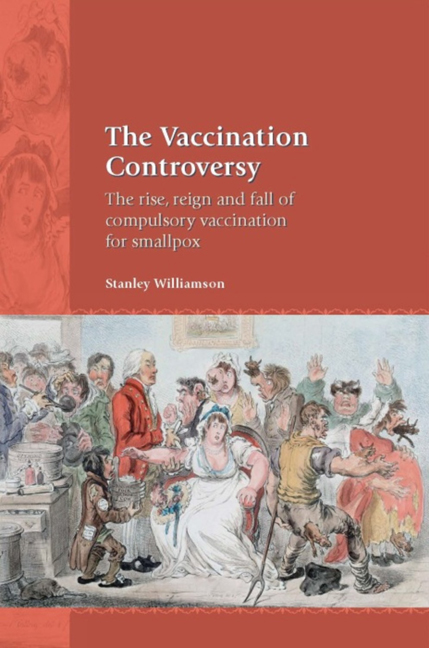Book contents
- Frontmatter
- Dedication
- Epigraph
- Contents
- Acknowledgements
- Part I The Road to Compulsion
- 1 The Byzantine Operation
- 2 The Small Pockes
- 3 The Engrafted Distemper
- 4 The Language of Figures
- 5 The Suttonian System
- 6 The Great Benefactor
- 7 The Speckled Monster
- 8 The Three Bashaws
- 9 A Competent and Energetic Officer
- 10 Formidable Men
- 11 The Present Non-System
- 12 Toties Quoties
- 13 Crotchety People
- Part II The Reign of Compulsion
- Part III The Retreat from Compulsion
- Notes
- Bibliography
- Index
13 - Crotchety People
from Part I - The Road to Compulsion
- Frontmatter
- Dedication
- Epigraph
- Contents
- Acknowledgements
- Part I The Road to Compulsion
- 1 The Byzantine Operation
- 2 The Small Pockes
- 3 The Engrafted Distemper
- 4 The Language of Figures
- 5 The Suttonian System
- 6 The Great Benefactor
- 7 The Speckled Monster
- 8 The Three Bashaws
- 9 A Competent and Energetic Officer
- 10 Formidable Men
- 11 The Present Non-System
- 12 Toties Quoties
- 13 Crotchety People
- Part II The Reign of Compulsion
- Part III The Retreat from Compulsion
- Notes
- Bibliography
- Index
Summary
Allen v. Worthy opened the floodgates. Parents objecting to the vaccination of their children found themselves in court time and time again, paying fines and costs that for many of them amounted to a severe financial burden. Refusal or inability to pay could result in their possessions being seized or sold off, or even a prison sentence. Typical of those who faced what was for them a desperate moral dilemma was a parent who ascribed his eldest child's death to vaccination, no doubt without justification, and felt he must resist the compulsory vaccination of a second child. He was summoned, convicted and paid the full penalty, only to be forced through the same train of events a second time. ‘What am I to do? I am a young man and cannot afford to pay 34 shillings every two or three months. I must either stifle my parental convictions and have my child poisoned or be ruined by continuing to refuse. They have threatened me again’. As an opponent of the compulsory legislation remarked, what it accomplished in practice was that a parent might be ‘imprisoned for ever’.
Shortly after the Act of 1867 was passed, but before Allen v. Worthy had revealed its full implications, the office of Vice-President for Education had changed hands again. Lord Derby had been supplanted as Prime Minister by Disraeli, and Disraeli, in December 1868, by Gladstone, for whom the pros and cons of compulsory vaccination were among the least of his preoccupations. The new Vice-President was W. E. Forster, the Quaker MP for Bradford, who by August 1870 was emerging from his long-drawn-out battle to secure the passage of his eponymous Education Act. As this struggle was reaching its climax a Bill was introduced by the anti-vaccinationist MP for Sunderland, John Candlish, which proposed that ‘no more than two orders shall be made, under the thirty-first section of the Vaccination Act of 1867, for the vaccination of any one child’, and also attempted to remove some confusion over certificates of unfitness for vaccination.
- Type
- Chapter
- Information
- The Vaccination ControversyThe Rise, Reign and Fall of Compulsory Vaccination for Smallpox, pp. 163 - 176Publisher: Liverpool University PressPrint publication year: 2007



